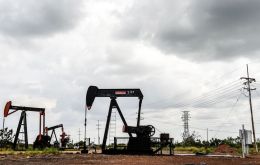MercoPress. South Atlantic News Agency
Energy & Oil
-
Tuesday, March 26th 2019 - 08:48 UTC
Another blackout in Venezuela: government blames “attack” on the power system

Venezuela blamed an “attack” on its electric system for a blackout on Monday, the second to hit the OPEC nation this month, that shuttered businesses, plunged the main airport into darkness and left commuters stranded in the capital. Power went out in much of Caracas and nearly a dozen states in the early afternoon, stirring memories of a week-long outage earlier in the month that was the most severe in the country's history.
-
Saturday, March 23rd 2019 - 09:02 UTC
Petrobras reviewing a deal with China's CNPC to build an oil refinery

Brazil's Petrobras is re-evaluating a preliminary deal with China National Petroleum Corporation (CNPC) to build an oil refinery in the state of Rio de Janeiro, Brazilian economic newspaper Valor Economico reported on Thursday, citing a source from Petrobras’ management.
-
Thursday, March 21st 2019 - 14:41 UTC
Brazil: Former President Michel Temer is arrested

Former Brazilian President Michel Temer was arrested on Thursday on corruption charges, a dramatic development in a sprawling corruption probe that has roiled Brazil has showed no sign of slowing.
-
Wednesday, March 20th 2019 - 09:14 UTC
Brazil: convoy with nuclear fuel came under fire; police escort repel attack

Armed men shot at members of a convoy transporting uranium to one of Brazil’s two working nuclear power plants on a coastal road in Rio de Janeiro state on Tuesday, police and the company managing the plant said.
-
Tuesday, March 19th 2019 - 08:17 UTC
Brazil's Vale iron ore miner ordered to suspend operations in two more dams

Brazilian court has ordered Vale SA, the world's largest iron ore miner, to suspend operations at two more dams, demanding that it prove the structures are stable. The court decision dated Friday is the latest in a series of orders forcing Vale to halt operations at various dams that contain the muddy detritus of mining operations after one such barrier collapsed in January, killing some 300 people.
-
Saturday, March 16th 2019 - 09:56 UTC
China and Argentina resume talks for the construction of a nuclear power plant

A delegation from China will visit Argentina this month to discuss the construction of a nuclear power plant, signaling possible progress in a deal that could increase Beijing’s deepening influence in Argentina. Accordingly, the “technical team” from China would meet local suppliers about the long-stalled nuclear power plant project, reportedly worth up to US$8 billion.
-
Saturday, March 16th 2019 - 09:21 UTC
Venezuelan continued oil fallout presents a challenge for global markets, says IEA

A major advisor to energy producing nations has suggested that the continued fallout from Venezuela could present a “challenge” for global oil markets. The International Energy Agency (IEA) has warned that crude supplies from Venezuela are at risk of falling sharply in the midst of an electricity crisis which has paralyzed the country recently.
-
Thursday, March 14th 2019 - 09:12 UTC
Union halts operations at Argentina's biggest gold mine

A strike at Canadian Goldcorp Inc’s Cerro Negro mine in Argentina has forced a halt to operations, the company said on Tuesday, calling the union’s action at its biggest mine illegal. Mining activities stopped when the strike by the Asociacion Obrera Minera Argentina (AOMA) union began on March 8, and processing is also now halted as surface stockpiles have run out, Vancouver-headquartered Goldcorp said in a statement.
-
Thursday, March 14th 2019 - 07:53 UTC
Beijing offers to help Venezuela restore its power grid

China offered on Wednesday to help Venezuela restore its power grid after President Nicolas Maduro accused U.S. counterpart Donald Trump of cyber “sabotage” that plunged the South American country into its worst blackout on record.
-
Wednesday, March 13th 2019 - 08:34 UTC
Shell agrees offshore oil exploration contracts in Colombia

Colombia’s government announced it had signed two exploration and production contracts with Shell in offshore areas of the Caribbean Sea that will require the company to make initial investments of US$ 100 million.
